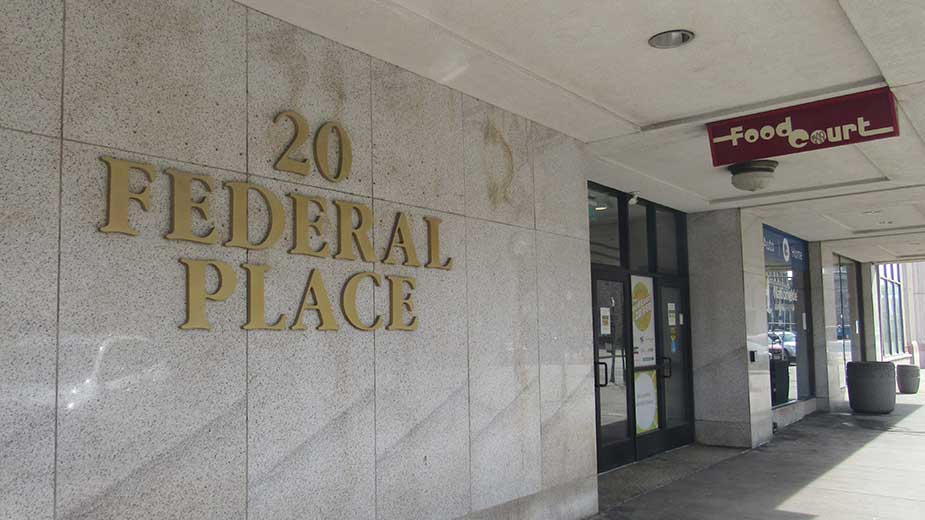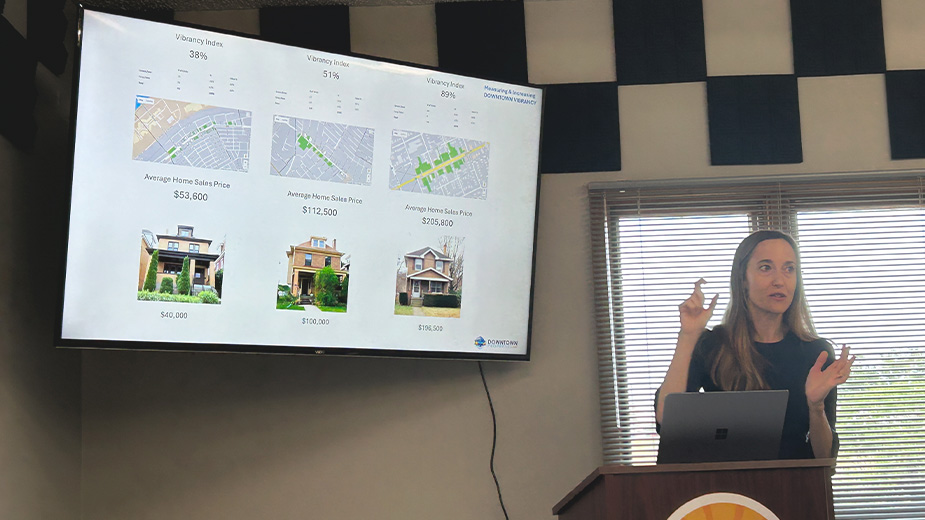Council Presses Administration on Lease, 20 Federal Deadlines
YOUNGSTOWN, Ohio – Members of City Council’s Building and Grounds Committee vented frustration with the city administration Thursday regarding a key project deadline the city is in danger of missing that could imperil the proposed $74 million redevelopment of 20 Federal Place.
During a meeting attended by a handful of 20 Federal tenants and other interested parties, council members questioned Finance Director Kyle Miasek, Senior Assistant Law Director Adam Buente and Sarah Scribner, project manager with Steadfast City Economic & Community Partners in St. Louis.
The city has until Monday to enter into a master lease agreement with a potential developer of the building, which would qualify for about $7.5 million in Ohio transformational mixed-use development – or TMUD — program tax credits, Miasek said.
Desmone, the Pittsburgh architectural firm working with the city to redevelop the building, created a special purpose entity, 20 Federal Place LLC, to lease the building for the purpose of qualifying for various state and federal incentives and TMUD development tax credits.
City officials raised objections to an earlier version of the master lease agreement that Desmone proposed, arguing it did not adequately protect city assets. Desmone, which applied for the TMUD tax credit last month – also assisted the city in securing a $6.9 million brownfield redevelopment grant.
“Is there a full understanding of this master lease and what is needed, what has to happen on the city side? There seems to be huge confusion going on,” said First Ward Councilman Julius Oliver, committee chairman. “And I know from the phone calls, meetings I’ve been in, the paperwork I have, everything is pretty much laid out. It’s pretty clear cut. So what’s the issue we’re having with the master lease? And does anybody know why it’s not on the board of control [agenda] and why City Council hasn’t received it yet?”
The proposed master lease agreement is being reviewed by the city’s outside council, Buente reported. “We did hear that they had a couple of minor issues,” he said. He has heard through “triple hearsay” that a special board of control meeting could be scheduled for Monday to act on the lease.
The board of control meeting scheduled for Thursday was moved to Friday because Mayor Jamael Tito Brown and Law Director Jeff Limbian were out of town. Neither attended Thursday afternoon’s committee meeting nor did Nikki Posterli, the mayor’s chief of staff and director of community planning and economic development, who Miasek said was with Brown and Limbian in Columbus.
“I think the administration is aware of the importance of the master lease,” Buente said.
“I don’t know if I can express any more how disappointed this entire community should be if we don’t get this master lease done. Because we lose the historical tax credits, the TMUD [tax credit], and now we have a half-demolished building sitting there for God knows how long,” Fifth Ward Councilwoman Lauren McNally said. “We’ll lose all our investors and, honestly, all our credibility to investors.”
Oliver offered further reflection.
“It just seems if this is the biggest deal, and everything is falling in line, and our administration isn’t here to make this deal go through,” he said. “It would almost seem like we’re dropping the ball on purpose and kicking people out of the building, just to have an empty building that’s paid for demolition [and] disgruntled and unhappy tenants that sit around waiting to see if this is going to really happen.”
The city also faces a June 30, 2023, deadline for utilizing the brownfield grant to fund remediation work at 20 Federal, which led the city to extend eviction notices to tenants in early July.
Scribner provided updates on efforts to work with building tenants and the project timeline. Steadfast City began working with the city on 20 Federal in 2020 under a grant awarded by the Appalachian Regional Commission.
Design and engineering work to support the planned demolition and remediation are in progress, with final plans to be delivered and contractor bid packages prepared by Oct. 1, Scribner said. Bid packages are to be made available beginning Oct. 3 with bids due Oct. 21. Contractors would be selected by Oct. 31. Construction mobilization for demolition and remediation would then begin Nov. 7.
Last month, Steadfast representatives met for about a week with building tenants and compiled relocation options and economic development resources. Of the 23 tenants, nine are prepared to leave the building by the Sept. 9 deadline, four are seeking appropriate relocation space, two have been formally granted extensions and seven are working with the city regarding legal issues and extensions.
The “biggest themes” uncovered during the sessions were requests for a time extension and financial support, Scribner said. Many tenants expressed a desire to remain in downtown, although tenants paying rent in the city-subsided space are challenged by the available market-rate locations.
On July 26, city officials and Steadfast representatives met to discuss those concerns. Two days later, most tenants received letters informing them that deadlines to vacate the building had been extended until Sept. 9 but that no financial assistance would be forthcoming from the city.
“The feeling was that based on the subsidized grants that have been provided by the city for so long, loans and micro-enterprise loans, the numerous financial support … has kind of been bleeding the city essentially [and] that it was time to kind of cut the cord and move forward,” Scribner said.
She also reported she has shared other available assistance options, such as state loans and grants through micro-enterprise, minority-owned business and women-owned business programs.
The lack of city assistance didn’t sit right with Oliver.
“So basically, businesses that needed assistance through the pandemic, alright. So you made it through that, but we’re not going to help you,” he said.
There is no money in the business development fund, which gets its income in part from 20 Federal rents, income that is lower because of a combination of tenants not paying rent they owe or not renewing leases and leaving, Miasek said.
Fifth Ward Councilwoman Lauren McNally, who had inquired about the business development fund as a potential source of assistance, also asked about whether American Rescue Plan funds could be used to assist tenants.
“ARP can be used for a multitude of business assistance,” Miasek said. The question becomes whether Council and the administration will “potentially sponsor and support helping these businesses, at the expense of potentially not assisting other businesses within the city” with ARP funds.
The administration is evaluating how it will use ARP funds. “There are a number of applicants that have asked for assistance that we are reviewing that meet the criteria of what we had from feedback from the community,” Miasek added.
“I feel like this situation is different because we created this situation,” McNally responded. We’re the ones putting these businesses out,” she said, and compared it to how the city purchased, then demolished, houses on the East Side for the failed Chill-Can project.
“I would say, you’ve got to find a way to earmark some of those ARP funds to help facilitate with relocation, gap funding for employees, whatever type of expenses,” Oliver said, “I’m not saying we’ve got to fully fund it but I think it would be advantageous to earmark something for the tenants that we put out when we could have made every effort to make this a softer landing.”
Council members also continued their questioning of the lateness of tenants being advised about the possibility of needing to relocate when the city, working with the Mahoning County Land Bank, had applied for the brownfield funds early in the year and had received positive feedback on the application, although the grant wasn’t awarded until June.
Oliver said he and his colleagues had been discussing the possibility of the city receiving the grant for months based on the quality of the application. “All of this led up to this horrible way of letting our tenants know they had to leave the building on such late notice,” he said.
“My understanding is that we were waiting for the green light from the city to formally engage and the city was not ready to have these conversations until the announcement was made that the city did receive that grant,” Scribner said. “We were honestly unsure if the grant would be [awarded] because the city did not meet all of the requirements.”
Miasek expressed caution when council members asked whether eviction deadlines could be further extended.
“So, this is kind of all stacked up,” and if any of the pieces of the capital stack are removed, “this whole stack could fall over,” Miasek said. “Right now, we’re teetering on this $25 million in state and federal historical tax credits,” plus the TMUD tax credit.
“We do not want to now jeopardize the grant on top of potentially putting at stake these federal dollars that would help move this project forward,” he continued. “If we jeopardize that first domino [the brownfield grant] and its timing, then we jeopardize our other dominoes.”
Copyright 2024 The Business Journal, Youngstown, Ohio.



